- Home
- Joel C. Rosenberg
Without Warning Page 12
Without Warning Read online
Page 12
“Of course not.”
“Just because of Laura?” he asked.
Yes, Matt, “just” because my cruel, heartless ex-wife ripped out my heart and drove over it with the SUV I’d just bought her. I didn’t say that, of course. I didn’t need to. He could see my whole body stiffen.
“Okay, fine—you’re not sure if you love her,” he said. “That makes sense. You hardly know her. But you want to get to know her, to see if there’s really something there. Right?”
“Yeah, I guess—yeah.”
“So?”
“So what?”
“So isn’t that a good reason for getting on a plane, going over to see the king—and while you’re over there, seeing Yael—and letting the New York Times pay for the trip?”
Matt took the next shift.
The snow had stopped falling, and the road crews had been able to keep the streets clear, but our prospects of getting to Bar Harbor more or less on schedule were dimming. We still had almost five hours to go.
I climbed into the backseat, stretched out as best I could, put in my earbuds, and zoned out to Paul Simon’s Graceland album. Scrolling through my e-mails, I found several from Allen and a blizzard of messages from other Times reporters comparing notes about the terror attacks. But for the first time I could ever remember, I had no interest in reading them. I didn’t want to scan the headlines or track the story. I didn’t want to reach out to any of my sources by e-mail, text, or phone. It wasn’t that I didn’t care. I did. Deeply. But I was spent. I simply didn’t have the emotional, physical, or intellectual energy to engage in any of it. It was as if all my circuit breakers were going off. There was nothing I could do about any of it, and so I set down my phone and faded off to sleep. And kept sleeping for hours.
I don’t remember the sound of the road or even the music in my ears. I don’t remember Matt stopping again for gas or my phone ringing, which, according to the log, it did several times, as Allen continued trying in vain to get ahold of me. What I do remember was Matt suddenly shaking me and a sudden blast of winter air.
“J. B., wake up.”
“Why? What’s going on?” I said, trying to get my bearings and wondering why it was so dark.
“I need you to drive,” he said. “I’m starting to weave all over the road.”
The brutal cold of Maine quickly snapped me back to reality. “Where are we?” I asked as I forced myself out of the Audi, stretched my legs, and let Matt climb into the back.
“Just outside of Bangor,” he said.
It had been a long time since I’d been home, I realized, and longer still since I’d driven all the way from D.C. The few times I had been up here in recent years I’d flown to Bangor and rented a car. Feeling decently rested, I agreed to take the next shift, then climbed into the driver’s seat, shut the door, turned on the seat warmer, and tried to get comfortable. The LED display on the dashboard indicated the temperature outside was in the single digits. Inside it was only seventy. I turned up the heater a few notches to get it to seventy-five.
I pulled back onto I-395, heading southeast now, having skirted Penobscot Bay. I kept my speed around fifty, well under the state limit. It was snowing hard again. The roads were slick. The last thing I wanted to do was wipe out so close to home. We had less than ninety minutes to go.
I glanced in my rearview mirror. Traffic was light. No one seemed to be following us. But for some reason I couldn’t shake the feeling that someone might be. I didn’t say anything to Matt. I didn’t want to worry him. His anniversary had already been ruined by a day of terror attacks ten times worse than 9/11. There was no point adding my paranoia to the mix.
The clock on the dashboard said 7:27 p.m. Matt had fallen fast asleep. With the rough weather, we were well behind schedule. Pulling out my phone, I noticed the battery was running low, so I connected it to the car charger. I didn’t need the GPS. I knew my way from here. But I did want to give my mom a call and let her know we were coming. I tried twice but got voice mail both times. I tried Annie’s cell phone too but got her voice mail as well. I left brief messages on our whereabouts and let them know that at the rate we were going, we would likely pull in sometime after eight thirty. Then I kept driving through the darkness and the blowing snow.
31
My phone rang.
I hoped it was my mom or Annie. But it was Allen MacDonald again. I ignored him. Then he called again, and a third time and a fourth, in rapid succession. He was determined to reach me. I was determined not to let him.
Then Matt’s phone began ringing, and Matt woke up in a fog. “Good grief, doesn’t your bureau chief ever give up?” he said from the backseat.
“I wish,” I said.
“Maybe you should take it this time.”
“Not a chance,” I said. “I’m still mulling what you said. But I’ll get back to him tomorrow, I promise.”
Then Matt, too, got a second call from the Times’ Washington bureau, and a third.
“Maybe something’s going on,” Matt said. “Seems pretty important.”
“No, it’s not important,” I said. “Just annoying. Turn off your ringer and go back to sleep. We’ll be there soon.”
“You sure?”
“Absolutely,” I said. “I’ll wake you as soon as we’re close.”
“All right, thanks.” Matt yawned again, then hunched over, pulled his coat up over his face, and went back to sleep.
Before long we passed the Hancock County Airport and then drove through the sleepy town of Trenton, population less than fifteen hundred. This was the last stop on the mainland. It swelled in the summer but was practically a ghost town this time of year. There was no reason to pull over. We had plenty of fuel, and we were anxious to get back to our family. So I continued driving, over Trenton Bridge and onto Mount Desert Island, hugging the shoreline and snaking along Highway 3 around the north side of Acadia National Park. We passed through Salisbury Cove and Hulls Cove until the highway turned into Eden Street, which led us directly into the town where Matt and I had both been born and raised.
I tried to recall the last time I’d been there and concluded it had to have been at least three years, though it might have been four. I’d never thought of myself as particularly nostalgic, but just seeing the sleepy coastal town with its ubiquitous churches, their steeples covered in a fresh blanket of snow, brought back a rush of warm memories. Hunting and fishing with my grandfather. Making blueberry pies with my grandmother. Cross-country skiing with Matt and hiking Cadillac Mountain with our friends. Christmas caroling in bone-chilling temperatures with the church youth group. My mom making us hot cocoa with marshmallows afterward. Sitting in front of a roaring fire in the parsonage while Pastor Mike regaled us with all kinds of crazy stories from his childhood. And his wife, Sarah, serving us bowls of her homemade chili. I hadn’t thought about such things in years.
Now, as I turned right on Main Street, I could see the streetlamps glowing yellow in the frosty-blue air and the white lights illuminating a giant wire outline of a moose set atop one of the shops. Most establishments were shut down for the evening. At this hour, no one was shopping for gifts or getting their hair done or buying supplies from the hardware shop or taking letters to the post office. But all of the town’s restaurants were open and doing a brisk business, perhaps packed with couples celebrating a belated Valentine’s Day. Despite the attacks, people here were still trying to live normal lives. They were a resilient, rugged people. I envied them. And though I was loath to admit it even to myself, I missed them.
In the distance, a siren broke the Norman Rockwell–esque tranquility. Soon a fire truck raced up behind me. I slowed and pulled to the side of the street to let it pass. Moments later two more fire engines were tearing down Main Street as well. As I began to drive again, I was cut off by two police cars and an ambulance coming down the street, each with lights blazing and sirens blaring. Matt woke up and asked what in the world was going on. I had no idea, but clearly it
was a big deal and would undoubtedly be the lead story in the next morning’s edition of the Mount Desert Islander.
We passed the hospital on our left and on our right the snow-covered Little League fields where we’d played ball for so many springs and summers. Soon we reached the south side of town and took a left on Old Farm Road. It had been freshly plowed, which was good. Then we saw flashing blue lights ahead and a police squad car blocking our path. I rolled down the window to ask what the problem was and immediately smelled the smoke.
“Sorry, gentlemen, ’fraid I can’t let you through,” one of two uniformed officers said as he sipped a thermos of coffee.
I didn’t recognize him, nor he me.
“House fire?” I asked.
“’Fraid so. And a nasty one—three alarms.”
Matt and I peered through the snowy forest around us but couldn’t see any fire trucks, much less the house in question.
“Whose house?” I asked.
“Dunno,” he said. “I’m kinda new here. Moved here from Portland. Just two months on the job.”
“So you got roadblock duty?”
“’Fraid so.”
“What number, then?” I asked.
“Uh, I don’t exactly . . . Eighty-five, maybe?”
My heart stopped. “Which street?”
“Sols Cliff,” he said.
“That’s our house,” Matt shouted from the backseat, the fear in his voice palpable.
“Yours?” the young officer asked, skeptical.
“We grew up there,” I said, my heart racing but trying to keep my voice calm. “Our mom’s still there. Please, we need to get through.”
“Let’s see some ID,” he said.
I had no time for this guy. I knew exactly what was happening. I knew why my calls to Mom and Annie hadn’t connected. I knew why Allen had been calling me repeatedly for the past hour. I threw the Audi in reverse, then shifted gears again and hit the gas. We shot around the back of the squad car and raced up the road, taking a sharp left onto Sols Cliff Road. Suddenly I had to slam on the brakes. The road was full of emergency vehicles, and I could see our family’s home—and the woods around it—going up in flames.
32
Matt bolted out of the car and ran toward the house.
Shutting down the engine, I threw open my door and raced after him. Matt was nearly tackled by a uniformed police officer trying to keep him from reaching the inferno. By the time I caught up to him, two more officers had blocked our path.
“My family!” Matt screamed. “They’re in there—my wife, my kids, my mom.”
“Who are you, sir?” one of the officers asked.
“Matt—Matt Collins,” he stammered, his face ashen, his body shaking. “Please, I have to get to them.”
“Do you have ID?” the officer said.
Matt stiffened. His eyes went wide. I’d never seen him like this. I actually thought for a moment he was about to throw a punch. So I stepped forward, put myself between Matt and the three of Bar Harbor’s finest. I showed them my driver’s license and my press pass. Then I explained again who we were and why we were here.
“Okay, boys, I’ve got this,” said a voice from behind us.
I turned around, expecting to see the young officer whose roadblock we’d blown through. Instead, I found an older gentleman, probably in his sixties. He wasn’t dressed in a police uniform but had on a black North Face snow jacket, a black ski cap, a red plaid flannel shirt, faded jeans, and old boots. He flashed his badge and identified himself as the chief of police. I didn’t recognize him. But then again, I’d never had any run-ins with the local cops—not since leaving for college, anyway.
“You’re J. B. Collins?” he asked.
“Yes, sir.”
“And you’re Matthew Collins?”
“Where’s our family, Chief?” Matt shouted, blowing off the question and causing each of the officers around him to tense.
The chief waved them off and took a step forward. “I’m afraid I have very bad news for you two boys,” he said over the roaring of the searing flames as ash and embers swirled around us like snowflakes.
“No,” Matt said, shaking his head and backing away.
I grabbed my brother’s arm to hold him steady. All the bravado in his voice had evaporated. His knees were beginning to buckle. I was afraid mine might too.
“Two are gone,” the chief said. “Two are severely wounded.”
My grip on Matt tightened, as did his on me. He was shaking his head but could no longer speak.
“What do you mean, gone, Chief?” I asked, my voice trembling. I resolved to stay strong for my brother’s sake, knowing full well what was coming next.
“There’s no easy way to put this, gentlemen—your mother is dead,” the chief said without emotion, looking first at me, then at Matt. “And, Mr. Collins, I’m afraid your son is dead as well.”
“No—no, I just—” Matt stammered, nearly inaudible, shaking his head, tears streaming down his face. “That can’t—that’s not—”
An explosion on the north side of the house suddenly sent all of us, including the first responders, scrambling for cover. I pulled Matt to safety behind one of the pumpers. A moment later, I heard one of the firemen say the heating-oil tank had just blown.
I stared in horror as the flames consumed what was left of the historic home. Our great-great-grandfather had built it in 1883 in a Greek Revival style. The half-acre waterfront plot alone was now worth a thousand times what he’d paid for it. The house had been enormous, with thirteen rooms, including six bedrooms, four and a half baths, and a grand living room with huge bay windows looking out over the Atlantic. Not a month went by without someone inquiring if it was for sale. But Mom would never sell. She had always said she was going to die in this house, and now she had.
“Annie? Katie?” Matt demanded. “They’re still alive—the chief said so.”
So he had. I grabbed Matt’s jacket and we found the chief again and demanded to know what had happened to my sister-in-law and niece.
“They’re alive,” the chief confirmed. “But they’re in critical condition.”
“Where are they now?” I asked.
“We airlifted them to Maine Medical Center not ten minutes ago,” he said.
“In Portland?”
“Yes.”
“Come on, Matt, let’s go,” I said, turning back toward my car.
“Follow me, gentlemen,” the chief insisted. “I’ll give you an escort.”
33
PORTLAND, MAINE
The next seventy-two hours were a blur.
Matt and I split most of our time between the ICU at Barbara Bush Children’s Hospital, part of the Maine Medical Center, and the adult ICU in the hospital’s other wing. The doctors urged us to remain hopeful, but both Annie’s and Katie’s situations could hardly have been more dire. Both were unconscious, badly burned, and suffering from severe smoke inhalation, and though I didn’t dare say it to Matt, I had little hope for their recovery based on what we’d been told so far.
On Friday evening, Agent Harris came to see us at the hospital. Unbeknownst to us, he and a team of investigators from the bureau had arrived in Bar Harbor early Friday morning. They’d spent the day collecting evidence and interviewing witnesses.
“I’m going to tell you something few others know at this point,” Harris told us as we stood outside the ICU, surrounded by uniformed local police and armed federal agents who had been personally tasked by President Taylor with providing round-the-clock security for our family. “You can’t print this, J. B., any of it. I’m letting you know this as a member of the family, as a courtesy, not because you’re a reporter.”
“I understand,” I said, and Matt nodded as well.
“Look, this is hard to say, but I think you need to know,” Harris said. “The deceased victims were double-tapped with a 9mm pistol.”
“Double-tapped?” Matt asked.
“Shot twice in rapi
d succession,” I explained, then turned back to Harris. “You’re saying this was a professional hit.”
Harris nodded. “The ME determined from his autopsy that your mom and Joshua died instantly from the gunshot wounds. Their bodies were severely burned in the fire, but they didn’t feel a thing. There was no smoke in their lungs, indicating that they were killed before the fire was started.”
The image of Matt’s face at that moment—as pale and queasy as when we’d first arrived on the scene of the fire—would be forever seared into my memory. I put my arm around him and helped him sit down in the waiting area. He looked terrible. He was unshaven. He’d barely eaten. His eyes were bloodshot and moist, but thus far he was containing his emotions. Barely. Under the circumstances, he’d been remarkably strong, but I wasn’t sure how much more he could take.
“And Annie? Katie?” he asked. “Were they shot too?”
“I’m afraid so,” the agent explained. “Your wife was shot twice. Your daughter only once. Whoever did this apparently thought they were both dead. But when the firefighters found them, they weren’t in the kitchen like the others. They were huddled in the basement, in a closet, bleeding and unconscious but away from the worst of the smoke.”
Neither Matt nor I said anything, so Harris continued. “As best we can ascertain, when the shooters left, your wife must have checked the others, realized Katie was still breathing, and dragged her downstairs to where she hoped they’d be safe until help came. We found a cordless phone in her hand. Turns out she managed to call 911 before she passed out.”
“She called 911? What did she say?” Matt asked.
“She told the dispatcher there were four terrorists in the house and that they’d been there for quite some time. She said they were all wearing black hoods, all speaking in Arabic, though the leader spoke some broken English. They were ransacking the place. And the leader kept demanding to know where you were, J. B. He kept shouting that you were supposed to have gotten there by seven. He thought you were hiding and that the family was lying to protect you or had warned you away somehow.”

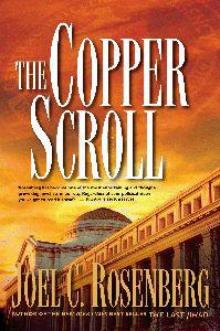 The Copper Scroll
The Copper Scroll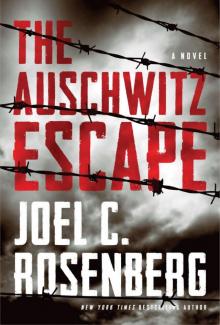 The Auschwitz Escape
The Auschwitz Escape The Last Jihad
The Last Jihad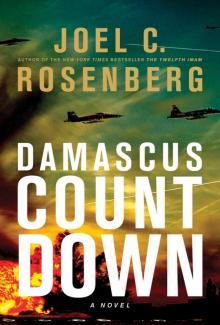 Damascus Countdown
Damascus Countdown The Persian Gamble
The Persian Gamble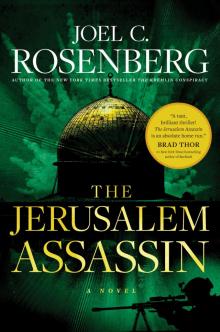 The Jerusalem Assassin
The Jerusalem Assassin Dead Heat
Dead Heat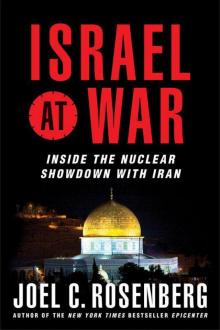 Israel at War: Inside the Nuclear Showdown With Iran
Israel at War: Inside the Nuclear Showdown With Iran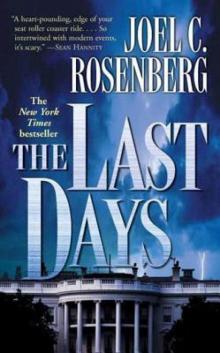 The Last Days
The Last Days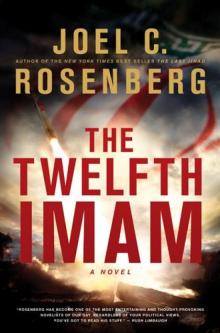 The Twelfth Imam
The Twelfth Imam Epicenter 2.0
Epicenter 2.0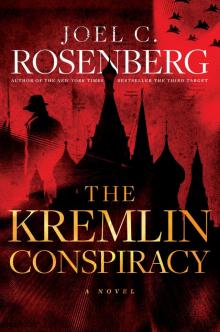 The Kremlin Conspiracy
The Kremlin Conspiracy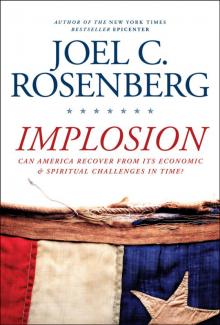 Implosion: Can America Recover From Its Economic and Spiritual Challenges in Time?
Implosion: Can America Recover From Its Economic and Spiritual Challenges in Time?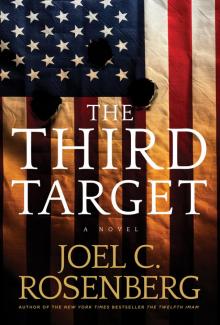 The Third Target: A J. B. Collins Novel
The Third Target: A J. B. Collins Novel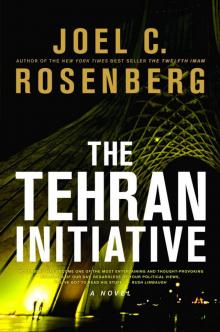 The Tehran Initiative
The Tehran Initiative Inside the Revolution
Inside the Revolution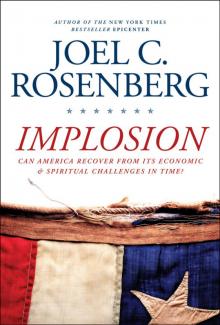 Implosion
Implosion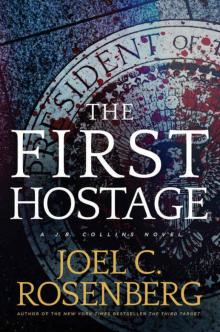 The First Hostage: A J. B. Collins Novel
The First Hostage: A J. B. Collins Novel